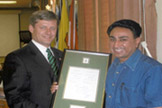Friday, 03 June 2005
 Just why is it that Conservative MP Gurmant Grewalís partially tape-recorded saga of meetings with Liberal emissaries before the May 19 vote in Ottawa is supposed to be so important again? The closest you can get to a serious answer comes from an article in the June 1 Globe and Mail in Toronto: "The Criminal Code contains sections that prohibit offering or accepting an advantage or benefit for an official's influence on government business, as well as soliciting or negotiating a government office in return for any kind of benefit or advantage." Yet if these sections of the Criminal Code are at all relevant for Mr. Grewalís saga, they also point to a statue of the legendary British political bulldog Winston Churchill, just southwest of the Toronto City Hall. Just why is it that Conservative MP Gurmant Grewalís partially tape-recorded saga of meetings with Liberal emissaries before the May 19 vote in Ottawa is supposed to be so important again? The closest you can get to a serious answer comes from an article in the June 1 Globe and Mail in Toronto: "The Criminal Code contains sections that prohibit offering or accepting an advantage or benefit for an official's influence on government business, as well as soliciting or negotiating a government office in return for any kind of benefit or advantage." Yet if these sections of the Criminal Code are at all relevant for Mr. Grewalís saga, they also point to a statue of the legendary British political bulldog Winston Churchill, just southwest of the Toronto City Hall.
(For the latest antics in Canadian federal politics see the counterweights report on The Plot Thickens.)
Late in 1903, far away in the United Kingdom, the youthful Conservative MP Winston Churchill met with the Liberal Chief Whip Herbert Gladstone. By the spring of 1904 Churchill had left the Conservatives to join the Liberals. Late in 1905 he became a new Liberal governmentís under-secretary at the colonial office. In 1908 he became President of the board of trade in H.H. Asquithís Liberal cabinet.
Before rushing to any too salacious criminal conclusions in Canada, more than a century later, we probably ought to be examining the international history of our system of government more closely. Just what are the essential differences between Winston Churchillís meeting with the Liberal Herbert Gladstone in 1903, and Gurmant Grewalís meetings with Liberal emissaries at Ottawa in 2005?
 Parliamentary democracy has continued to evolve over the intervening 102 years ó and has never been exactly the same in Canada as in the United Kingdom. But in this respect at least, have things changed quite that much and is Canada really that different? Parliamentary democracy has continued to evolve over the intervening 102 years ó and has never been exactly the same in Canada as in the United Kingdom. But in this respect at least, have things changed quite that much and is Canada really that different?
Canadian voters generally may be less familiar nowadays with the more ancient traditions of parliamentary government than they used to be. But it certainly is part of the traditional rules of the game that Conservatives do sometimes switch to Liberals, and vice-versa. (Winston Churchill himself subsequently even returned to the Conservatives in the 1920s.) And it is hard to see how this can happen, without occasional meetings between Conservatives and Liberals, to navigate the process of switching sides.
 We could change these traditional rules of the game, to suit what we may see as our more ethically fastidious early 21st century Canadian tastes. But would it finally improve our present parliamentary democracy to cast some retrospective criminal suspicion on Winston Churchillís meeting with Herbert Gladstone in 1903 ó if there were, e.g., any serious hint that Gladstone just might have at some point alluded to Churchill that, if he did finally cross the floor to join the Liberals, and subsequently kept his nose clean and did a good job, a Liberal cabinet post could eventually come his way? (In those days even politicians did not tape-record their conversations. So we will never know exactly what was said.) We could change these traditional rules of the game, to suit what we may see as our more ethically fastidious early 21st century Canadian tastes. But would it finally improve our present parliamentary democracy to cast some retrospective criminal suspicion on Winston Churchillís meeting with Herbert Gladstone in 1903 ó if there were, e.g., any serious hint that Gladstone just might have at some point alluded to Churchill that, if he did finally cross the floor to join the Liberals, and subsequently kept his nose clean and did a good job, a Liberal cabinet post could eventually come his way? (In those days even politicians did not tape-record their conversations. So we will never know exactly what was said.)
Still more to the point, what does it say about us nowadays that we feel we have to make criminal allegations about our opponents, in order to make our democratic politics seem interesting to the electorate? (Might this actually be one of the reasons that the electorate is increasingly not bothering to vote, or otherwise pay much attention to conventional political debate? And if Canadian voters are all that upset about the present state of political morality in their country, even as reflected in the sordid enough Gomery inquiry testimony, why are the Liberals still doing as well as they recurrently seem to be doing in the opinion polls?)
Still more to the point again, if we are in fact going to have a fresh period of extended and perhaps even healthy crisis in Canadian federal politics, why canít it finally be about something that is important for the countryís real future?
The federal budget, e.g., is supposed to be the main focus in Parliament between now and the summer recess on June 23. It is apparently (and rather quickly) going to become somewhat lost in the internal deliberations of the finance committee. But if there are serious big issues here, why canít they receive some airing in wider parliamentary debate as well?
 And then on Tuesday, May 31 Canadian "aboriginal leaders signed deals with Ottawa ... that will give them a direct say in native policy development." Prime Minister Martin proclaimed: "Today marks an important step in building a stronger and more positive relationship between the government of Canada and aboriginal Canadians." And then on Tuesday, May 31 Canadian "aboriginal leaders signed deals with Ottawa ... that will give them a direct say in native policy development." Prime Minister Martin proclaimed: "Today marks an important step in building a stronger and more positive relationship between the government of Canada and aboriginal Canadians."
This is almost certainly of much greater consequence for the long-term future of all Canadians than Gurmant Grewalís tapes. Why canít our Parliament help to inform and educate us on this important issue? Isnít that finally the sort of thing our MPs are getting paid to do? Our federal politicians seem to keep telling us that nothing their opponents are saying or doing has anything to do with real principles. So what is it thatís so important right now that does have to do with real principles? And why canít they all start talking about that?
* * * *
The account of Winston Churchillís defection to the Liberals in the UK here is based on two older but still serviceable sources: Robert Ensorís v. XIV in the old Oxford History of England ó England, 1870Ė1914 (which "despite its age ... remains ... the most detailed standard general history of ... Late Victorian Britain"); and Henry Pellingís "comprehensive" and highly readable one-volume biography, Winston Churchill, which first appeared in 1974. Only registered users can write comments.
Please login or register. Powered by AkoComment 1.0 beta 2!
|
